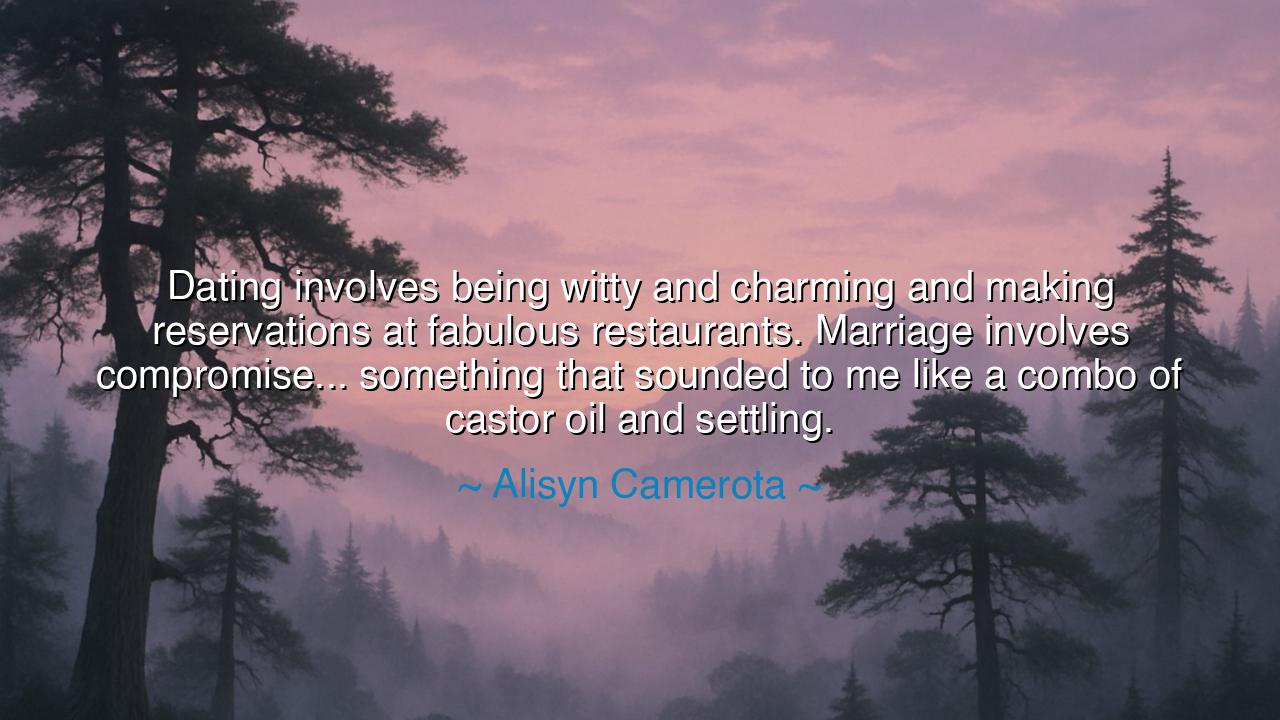
Dating involves being witty and charming and making reservations
Dating involves being witty and charming and making reservations at fabulous restaurants. Marriage involves compromise... something that sounded to me like a combo of castor oil and settling.






“Dating involves being witty and charming and making reservations at fabulous restaurants. Marriage involves compromise... something that sounded to me like a combo of castor oil and settling.” Thus spoke Alisyn Camerota, with wit sharpened by truth and humor tempered by understanding. Her words, light at first glance, are in fact a reflection of one of life’s deepest transformations — the passage from illusion to intimacy, from the glitter of courtship to the quiet labor of love. For in this saying, she reveals that the journey from dating to marriage is not merely the crossing of time, but the evolution of the soul itself.
In the early stages of love — what Camerota calls “dating” — we adorn ourselves in the finery of performance. We become witty, radiant, attentive; every word is a song, every glance a promise. It is a dance of attraction, a theater of first impressions where both hearts wear their best masks. There is joy in this dance — it is the celebration of possibility, the intoxication of discovery. Yet it is also fragile, for it is built upon the dream of who we wish to be, not yet the truth of who we are. The fabulous restaurants and charming words are but the surface shimmer of a deeper quest: the yearning to be seen, admired, and loved.
But when the dawn of marriage comes — when two souls step beyond the stage into the daily work of living together — the dream must meet the soil of reality. It is here that Camerota’s “compromise” enters, not as defeat, but as the alchemy that transforms affection into endurance. To compromise is not to surrender, but to harmonize; not to settle for less, but to make room for another within oneself. Yet she confesses that it first “sounded like castor oil” — unpleasant medicine — and “settling,” the resignation of hope. This is the great illusion of youth: that love, to be pure, must remain effortless. But true love, like all sacred things, demands effort — it must be worked, molded, and tended, or it withers.
The ancients knew this well. In the story of Odysseus and Penelope, there is both the fire of passion and the endurance of patience. For twenty years, Penelope weaves and unweaves her tapestry, waiting for her husband’s return. Odysseus, tested by storms and temptation, learns that love is not found in beauty or adventure, but in fidelity — the quiet strength of belonging to another. When they are finally reunited, their love is not the sparkling charm of first meetings, but the deep river of understanding that flows only through years of shared sacrifice. This is the essence of Camerota’s teaching: that marriage, though stripped of glamour, contains a nobler beauty — the beauty of steadfastness.
To see compromise as a burden is to misunderstand its power. It is not the enemy of joy but its foundation. The one who learns to yield learns also to receive. In every partnership, there will come moments when one must bend so that both do not break. The wise do this not out of weakness, but out of love. Just as a tree bends before the storm to preserve its roots, so must the heart bend before pride to preserve peace. The castor oil of compromise, bitter at first taste, becomes the medicine that heals the ego and strengthens the bond.
And yet, Camerota’s humor remains important, for she reminds us not to romanticize sacrifice until it becomes martyrdom. Marriage, though it demands humility, must never lose laughter. The great philosopher Socrates, when asked the secret to a happy marriage, replied with irony, “By all means, marry. If you get a good wife, you’ll be happy; if you get a bad one, you’ll become a philosopher.” In this jest lies the same wisdom as Camerota’s quote — that love is not a constant feast of perfection, but a daily meal of patience, forgiveness, and the occasional shared joke about life’s absurdities.
So, my children, learn from her lighthearted truth. Let your dating be full of joy and your marriage full of grace. Do not mistake the fading of glamour for the death of love; it is merely its transformation into something truer. Do not fear compromise; embrace it as the language through which two hearts learn to speak as one. Be willing to grow smaller in pride, that your love may grow larger in depth. And when the sweetness of early romance fades, taste instead the richness of shared laughter, quiet understanding, and unspoken loyalty.
For in the end, Alisyn Camerota’s jest is no jest at all, but the distilled truth of every enduring union: that love is not a performance to be perfected, but a partnership to be nurtured. Dating is the poetry of beginnings, but marriage is the prose of life — steady, imperfect, and real. And though the poetry may fade, the prose, written with patience and courage, will outlast time itself.






AAdministratorAdministrator
Welcome, honored guests. Please leave a comment, we will respond soon